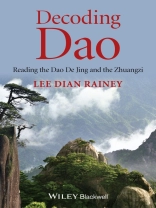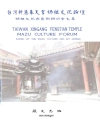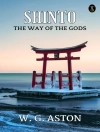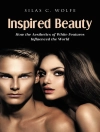Written by a leading authority on Chinese philosophy,
Decoding Dao uniquely focuses on the core texts in Daoist
philosophy, providing readers with a user-friendly introduction
that unravels the complexities of these seminal volumes.
* Offers a detailed introduction to the core texts in Daoist
philosophy, the Dao De Jing and the Zhuangzi, two of
the most widely read – and most challenging – texts in
China’s long literary history
* Covers the three main ways the texts can be read: as religious,
mystical, and philosophical works
* Explores their historical context, origins, authorship, and the
reasons these seminal texts came into being, along with the key
terms and approaches they take
* Examines the core philosophical arguments made in the texts, as
well as the many ways in which they have been interpreted, both in
China itself and in the West
* Provides readers with an unrivalled insight into the
multifaceted philosophy of Daoism – and the principles
underlying much of Chinese culture – informed by the very
latest academic scholarship
สารบัญ
Book Notes x
Chronology xi
Section One: The Context
Chapter One The Social and Political Background– Confucianism–Mozi and Mohism (Moe-ds) and (Moe-ism)–Yang Zhu and Shen Dao (Ya-ahng, Jew)– Language and Logicians–Trends During the Warring States Era–Cultural Heroes and Concepts–Summary 3
Section Two: Authors and Texts
Chapter Two The Dao De Jing–Why Does the Dao De Jing/Tao Te Ching/Laozi/Lao Tzu Have So Many Names?– Dao De Jing, The Author–Dao De Jing, the Text–The Dao De Jing, the Style of the Text–The Dao De Jing in the West– The Zhuangzi, the Author–The Zhuangzi, the Text–The
Zhuangzi, the Style of the Text–The Zhuangzi in the West–Issues in Translation–Summary
27
Chapter Three The Dao? A Dao? Dao? daos? dao?–Images: 49
Water, Women, Baby, Root, and Others–What Is the Problem?–Conventional Values: Pairs of Opposites– Being and Non-Being–Summary
Chapter Four Illogical Statements?–Decoding–Not Acting, Not Knowing, Not Desiring–Ziran, Self-So, Natural, Spontaneous–Language–Morality–Summary 70
Chapter Five War–Government, Society, and the Sage- Ruler–The Golden Age–Advice for Would-Be Sages–Losing dao–Summary 90
Chapter Six What Is the Problem?–Anti-Confucians– Anti-Mohists–Being Useless–Point of View–This and That–Knowing How–Knowing What–Summary 111
Chapter Seven Language: Convention and Culture–This/ That, True/False–Language Is OK, Up to a Point– How to Use Language–Clarity–Death– Transformation–Survival of Consciousness and an Afterlife–Immortality–Dao–Summary 132
Chapter Eight Public Life–The Golden Age–What Should We Do?–Mirror–Forgetting–Mind/Heart Fasting–Perfected People–The Relationship of the Dao De Jing and the Zhuangzi–Summary 156
Section Three: Developing Dao
Chapter Nine The School of Zhuangzi and Followers of the Dao De Jing–The Han Feizi–The Guanzi–Huang- Lao–The Huainanzi–The Liezi–The Han Dynasty and Beyond–Summary
179
Chapter Ten Organized Daoism–The Search for Immortality–Organized Groups–The Cult of Laozi– Modern Organized Daoism–The Mystical Reading– The Philosophical Reading–Modern Daoism–Dao Lite–A Lao-Zhuang Daoist–What Is Daoism and Other Problems 202
Glossary of Technical Terms 232
Glossary of Pronunciation 235
Further Reading 237
Bibliography 239
Index 252
เกี่ยวกับผู้แต่ง
Lee Dian Rainey is Associate Professor in the Department of Religious Studies at Memorial University of Newfoundland, Canada. She has taught Chinese philosophy for more than twenty years and has published widely in this area. Her publications include Confucius and Confucianism: The Essentials (Wiley-Blackwell, 2010).












